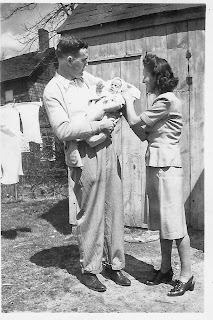 |
| My mother, Elsie Weathers (left), and her friend Phyllis McGuire at Biggs Hospital c. 1943. |
I believe the U.S. government should cover the health
expenses of every American citizen. Some call this “Medicare for everyone.”
Some call it a “single-payer system,” the single payer being the federal
government. Some call it the European or Canadian system. Some call it
“socialized medicine,” thinking that term is pejorative, although I find it
neither pejorative nor accurate. (Most of those who throw around the word
“socialist” have no idea what it means.)
Whatever you call it, I believe that if a person gets sick, he or she should be able to go to a doctor or a hospital, receive treatment and medicine, and have to pay nothing.
The Affordable Care Act, more commonly known as Obamacare,
is not what I would prefer; it still leaves people vulnerable to large medical
costs. It is nevertheless better than the system we have had until now.
Obamacare is, of course, much in the news today, but it is not my subject here.
My subject is universal, free health care. I believe it
should be the law of the land in any country that, like ours, can afford it. My
stake in this is personal: Without free, government-sponsored health care, I
would never have been born.
Sometime around 1940, my mother, then in her early twenties,
a girl from a hardscrabble upstate New York farm, contracted tuberculosis. Shortly before that, my father, almost as young, a boy from a small town in
Kentucky, had contracted tuberculosis while working in New York City. They did not
know each other when they got sick. They met after they had both been admitted
to Biggs Memorial Hospital, a tuberculosis sanatorium overlooking Cayuga Lake,
near Ithaca, New York.
For nearly four years, my mother was in the hospital, taking
the “rest cure.” In fact, she had little rest, enduring operation after
agonizing operation. Periodically, long needles were inserted into her lung
cavity, through her back. The last operation she had resulted in her right lung
being shut down forever. My father, too, went under the knife, though not quite
so drastically. He was in the hospital for about three years.
My father and mother fell in love in the hospital and
married after they were finally released, in 1945. I was born in 1946. I was an
“accident” that was a bit dangerous for my still-weak mother, but we both came
out of it okay.
 |
| Without socialized medicine, this scene would never have occurred. That's my father, my mother, and me in the middle. |
My father lived to be 84. My mother lived to be 93. I never
saw either of my parents in a bathing suit; they were too embarrassed by the
scars on their backs. And yet, until the day they died, they spoke of their
time at Biggs Memorial in—surprise—the most affectionate, almost reverent
terms. They spoke of the kind and beautiful nurses (and, yes, of the occasional
sadistic nurse) and of the warm, caring, and competent doctors (and, yes, of
the occasional cold-hearted doctor). Most of all, they spoke of the fellowship
of the sick who made up the patient population. Friends they loved died in that
hospital, and they were some of the dearest friends my parents ever had. Those
who lived remained their dear friends for years after.
For my parents, their time at Biggs was a time of prolonged
physical pain made bearable by the balm of human kindness.
Now to the point: For more than three years of hospital
care, innumerable operations, and hundreds of medications, my mother paid exactly
nothing. Not a dime. Nor did my father ever pay a cent for his care at Biggs.
New York State paid for it all, on the assumption that tuberculosis was
societally too dangerous to be left untreated and its victims too contagious to
remain in the general population. The taxpayers of New York paid for my parents’
care.
That’s why my parents became lifelong supporters of
universal, free health care—go ahead, call it socialized medicine—and why I feel
the same way today.
Thanks to those years of free medical care, my father and
mother went on to live enormously productive, generous lives. I can assure you
that New York State earned back all the money it invested in their care—and
much, much more.
Whenever one of my conservative friends complains about
“socialized medicine,” I tell them this story. It doesn’t shut them up, but it
should.

